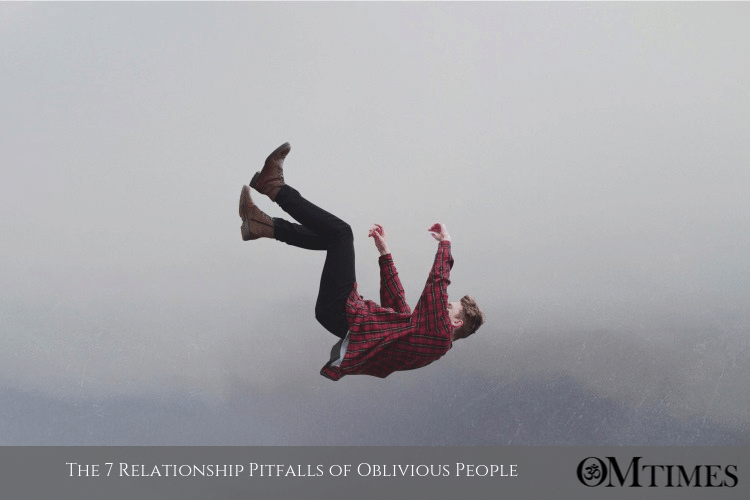The 7 Relationship Pitfalls of Oblivious People

Oblivious individuals convince themselves that everything’s okay, even when it’s not. Here are 7 relationship pitfalls of oblivious people at school, home, and work.
Relationship Pitfalls for the Oblivious
Relationships aren’t always easy. Sometimes they go smoothly, and we feel like things are effortless between the other person and us, but sometimes we encounter someone who can really make a lot of trouble for us.
Quite often, there are signs of trouble early on. We can protect ourselves from difficult people if we pay close attention to these “red flags.”
If we don’t pay attention to the red flags that warn us of a difficult person in our presence or if we’re in denial about the possibility that someone is problematic, we’re going to be at a distinct disadvantage when someone like this comes along.
On the other hand, if we’re on the ball and paying attention, we can spot the difficult people at work, at school, and at home and we can choose how to handle them, either by steering clear of them or by dealing with these difficult people as strategically and effectively as possible.
Some folks don’t want to believe that there are difficult people among us. They want to believe that everyone is just as nice, reasonable, honest, and considerate as they are, even when presented with ample evidence of the opposite. When red flags are waving in their face, they close their eyes and pretend to themselves that everything is fine.
I call these people “oblivious,” not because they lack intelligence but because they’re willfully ignorant of the dangers lurking at work, school and at home.
These oblivious individuals convince themselves that everything’s okay, but they’re putting themselves in peril. When we refuse to acknowledge the possibility that someone is problematic, we’re in danger of being exploited, manipulated and mistreated.
Here are 7 relationship pitfalls of oblivious people at school, home and work:
1. When you’re oblivious, you’re easy to trick, con, and manipulate.
When you’re unwilling to face the fact that difficult people are out there ready to prey on you, you set yourself up as the perfect victim for these unscrupulous individuals.
Predators are lazy and want to conserve energy. When faced with the choice between someone who’s easy to take advantage of and someone who presents as more of a challenge, most predators will go for the easy mark. Being oblivious makes you the easiest mark around.
2. When you’re oblivious, you smell like prey.
When you can’t tell the kind people from the cruel ones, the predators will always seek you out, and you’re doomed to be in bad relationships.
Predators are always sniffing out the weakest animal in the pack. When you’re oblivious, you come across as more naïve and vulnerable than the other people around you. To a predator, that makes you smell like prey.
3. When you’re oblivious, you have no voice.
If you’re not clear about what’s going on, you can’t speak up on your own behalf.
When you’re in denial and ignoring the red flags, you’re not going to be prepared when a difficult person comes along and tries to mess with you.
If you remain in denial while they’re hurting you, it’s even worse. Either way, not knowing what’s going on makes it impossible for you to tune in to your feelings and your needs or ask for what you want.
4. When you’re oblivious, people will take advantage of you.
It’s easy to be exploited when you’re unclear about the other person’s motivations or intentions.
The more oblivious you are, the more attractive you are to those who want to use or exploit people. If you blindly trust people, you give them a free pass to really screw you over.
5. When you’re oblivious, you get no respect.
When someone is getting away with mistreating or exploiting you, it’s easy for them to look down on you.
Children are naïve and clueless. When you choose to be oblivious, you don’t come across as an empowered adult. You come across as a helpless child. That garners no respect. If you want to be respected, you have to open your eyes, stand on your own two feet, and ask for what you want.
6. When you’re oblivious, it always gets worse.
When you don’t realize all the bad things the other person is up to, you let them get away with anything and everything.
If you insist on denying how badly someone is treating you, you’re giving them a clear message that they can keep getting away with their hurtful behavior. The longer this goes on, the more emboldened this person will become in their cruelty or exploitation.
7. When you’re oblivious, there’s no way out.
When you’re in denial around being mistreated, you become helpless to extricate yourself from a bad situation.
If you can’t see what’s going on, you can’t change anything for the better. The starting point to improving your life is facing the truth that there are difficult people out there and acknowledging the red flags that are waving in your face.
These 7 pitfalls are the reasons why it’s so important that you face the truth about what some people are capable of. When you’re no longer oblivious, you’re armed with the necessary tools for dealing with the difficult people who you might come across at home, at school, and at work.
Click HERE to Connect with your Daily Horoscope on OMTimes!
You will also enjoy 3 Guaranteed Methods for Grounding
About the Author
Marcia Sirota MD FRCP(C) is a board-certified psychiatrist, that does not ascribe to any one theoretical school. Rather, she has integrated her education and life experiences into a unique approach to the practice of psychotherapy. She considers herself a realist with a healthy measure of optimism. Sign up here for her free monthly wellness newsletter. Listen here to her latest podcast. mariasirotamd.com
Dr. Marcia Sirota is a Toronto-based board certified psychiatrist specializing in the treatment of trauma and addiction, as well as founder of the Ruthless Compassion Institute, whose mandate is to promote the philosophy of Ruthless Compassion and in so doing, improve the lives of people, everywhere.






